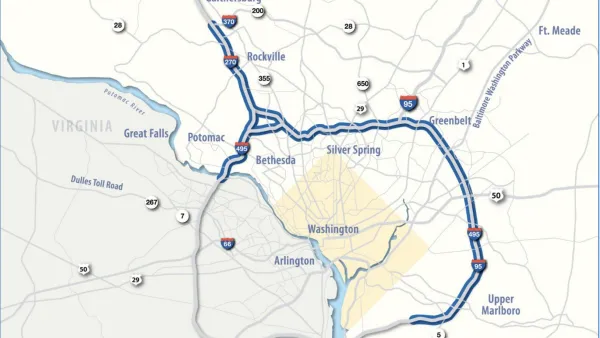An examination of the proposed plan for the West Bay Parkway in Florida reveals many holes, a wasteful project, and the need for more accountability in transportation planning.
Kevin DeGood provides an installment in the "White Elephant Watch" series, which highlights unnecessary transportation infrastructure projects—in this case, the West Bay Parkway in Bay County, Florida. "The project has an estimated cost of $566 million," writes DeGood. Yet, "[g]iven its location, the proposed parkway will not serve as an effective alternative route for travelers on U.S. Route 98. Moreover, alternative investments in things such as public transportation would provide far greater congestion relief at a much lower cost."
The article breaks down each of these points. For instance, DeGood debunks the claim by the Florida Department of Transportation (FDOT) that "the West Bay Parkway will reduce congestion along U.S. 98 by siphoning off substantial traffic in the future" by citing the target roadway level of service (LOS):
"As mentioned, approximately half of the proposed parkway would consist of widening CR 388 from a two-lane highway to a four-lane divided highway. If this corridor were actually an attractive or realistic alternative to U.S. 98 for area drivers, then traffic modeling would show serious congestion problems along CR 388 in future years without the widening. However, when FDOT projected out to 2035, it found that “CR 388 was not among the roads listed as failing to meet the LOS standard,” meaning that even with travel demand assumptions—pegged at 4.78 percent annually—that outstrip population growth, CR 388 still performed perfectly well without the parkway expansion. In short, CR 388 is not an effective alternative to U.S. 98 for what little through traffic the area generates—nor does it produce much local traffic."
Other exceptions DeGood takes with the proposed plan include overly ambitious population growth targets and a lack of feasibility for the tolling option for financing the project.
All in all, according to the article, the project is a perfect example of the types of products yielded by a funding system—from federal down to the state level—that requires no accountability in transportation planning.
FULL STORY: White Elephant Watch: Vol. 2

Analysis: Cybertruck Fatality Rate Far Exceeds That of Ford Pinto
The Tesla Cybertruck was recalled seven times last year.

National Parks Layoffs Will Cause Communities to Lose Billions
Thousands of essential park workers were laid off this week, just before the busy spring break season.

Retro-silient?: America’s First “Eco-burb,” The Woodlands Turns 50
A master-planned community north of Houston offers lessons on green infrastructure and resilient design, but falls short of its founder’s lofty affordability and walkability goals.

Test News Post 1
This is a summary

Analysis: Cybertruck Fatality Rate Far Exceeds That of Ford Pinto
The Tesla Cybertruck was recalled seven times last year.

Test News Headline 46
Test for the image on the front page.
Urban Design for Planners 1: Software Tools
This six-course series explores essential urban design concepts using open source software and equips planners with the tools they need to participate fully in the urban design process.
Planning for Universal Design
Learn the tools for implementing Universal Design in planning regulations.
EMC Planning Group, Inc.
Planetizen
Planetizen
Mpact (formerly Rail~Volution)
Great Falls Development Authority, Inc.
HUDs Office of Policy Development and Research
NYU Wagner Graduate School of Public Service



























